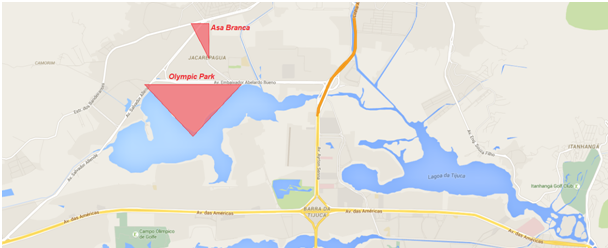
”It’s like we’re throwing a party in our house where the whole world is invited, but we the owners can’t be in the way.” That’s how community leader Carlos Alberta Costa, known as Bezerra, describes his feelings towards the Olympic Games. With the Olympic Park at less than one kilometer distance, his community Asa Branca has been impacted by the infrastructure preparations for the event and a resulting growing insecurity in the area. In response, Asa Branca has begun installing 23 security cameras around the community.
The security project is in line with the history of Asa Branca, a favela whose residents have always worked hard to provide themselves with basic services. It is a small community of 8,000 people, built along a small number of parallel dead-end roads which intersect only with the main road (Salvador Allende) that runs along one side of the community, so surveillance is a feasible job.
”Everyone knows each other, looks out for each other, or the kids. It’s like a big family,” says 18-year-old Paulo. He helps keep the neighborhood safe by volunteering at the gates by the entrance of the favela. ”Four people at a time work at the gates, in shifts of 12 hours.”
His friend Stephan, 16, compares the system to the gated condominiums that surround Asa Branca. ”The gates are like the condominiums around us. Everybody is checked before coming in and we always know who leaves.” In this way, the gates contribute to a sense of security: ”It is kind of a false sense of security for the residents. Everybody can still enter, but now they have to pass this first. That might scare some strangers away,” Bezerra explains.
Strangers come in more frequently these days. Bezerra links this to the new Transcarioca BRT line: ”The BRT is connecting all parts of the city to this location, where it was always very separated. We live in a peaceful favela, but my community is afraid of violence coming in with all these strangers. Also, we notice more addicts around here, confused and causing trouble, not able to work, stealing and bringing drugs. The government is not treating addiction as an illness, so they are not helped.”
Conversely, the gates keep the children in, so they don’t play close to the dangerous BRT tracks without supervision.
During the Olympics, the nearly 30-year-old, historically safe community feels they may be unfairly targeted by police. ”This is a community without traffickers, without anything. Still, the police come into this area with the idea of a favela as extremely dangerous. They can use violence against our residents, which are not bandits. They don’t know the community, don’t respect the families and don’t know who’s to be trusted and who isn’t. Our people don’t accept being addressed with ignorance. Also, if anything happens in our neighborhood, it will affect our reputation.”
The community of Asa Branca gathered in search of a way to deal with these concerns. Bezerra illustrates the process by showing the notes and signatures from the meeting. The conclusion was to install security cameras as both a crime deterrent and so that if anything happens, there is evidence.
Bezerra does not worry so much about what happens during the Olympics, but the months following the mega-event. He says: ”This will be the safest place on earth. We have the strictest security. I worry about after the Games.”
Bezerra is critical of the way the Olympics have impacted his community and the surrounding area: ”Yes, there is better infrastructure now and it is only there because of the Olympics. But that should have happened 20 years ago. It happened now because [the authorities] need it. How can we be thankful for that? A lot of families were evicted for the BRT. Our children are searched all the time. We changed our routines. We have lived with dust in our eyes for almost two years and there is no compensation. Not even tickets for some of the games!”
Paulo adds: ”The Games are really great, I love sports. But unfortunately, with these events there is nothing for us. There is an entire Olympic Park next door, but no space for recreation and sports we can use.”
There is a feeling that the Olympics are bringing a sense of insecurity and disruption to this tight-knit, peaceful community, without any compensation or invitation to the event. ”It is the same as every event in Brazil. It’s for the rich and powerful, but we pay the price. No community around here is satisfied with how it’s been carried out, especially [nearby] Vila Autódromo.”
As the Olympics approach, the community is now beginning to install the cameras to ensure their sense of security. The project serves as an example of yet another inventive solution Asa Branca residents have developed to meet their basic needs.


